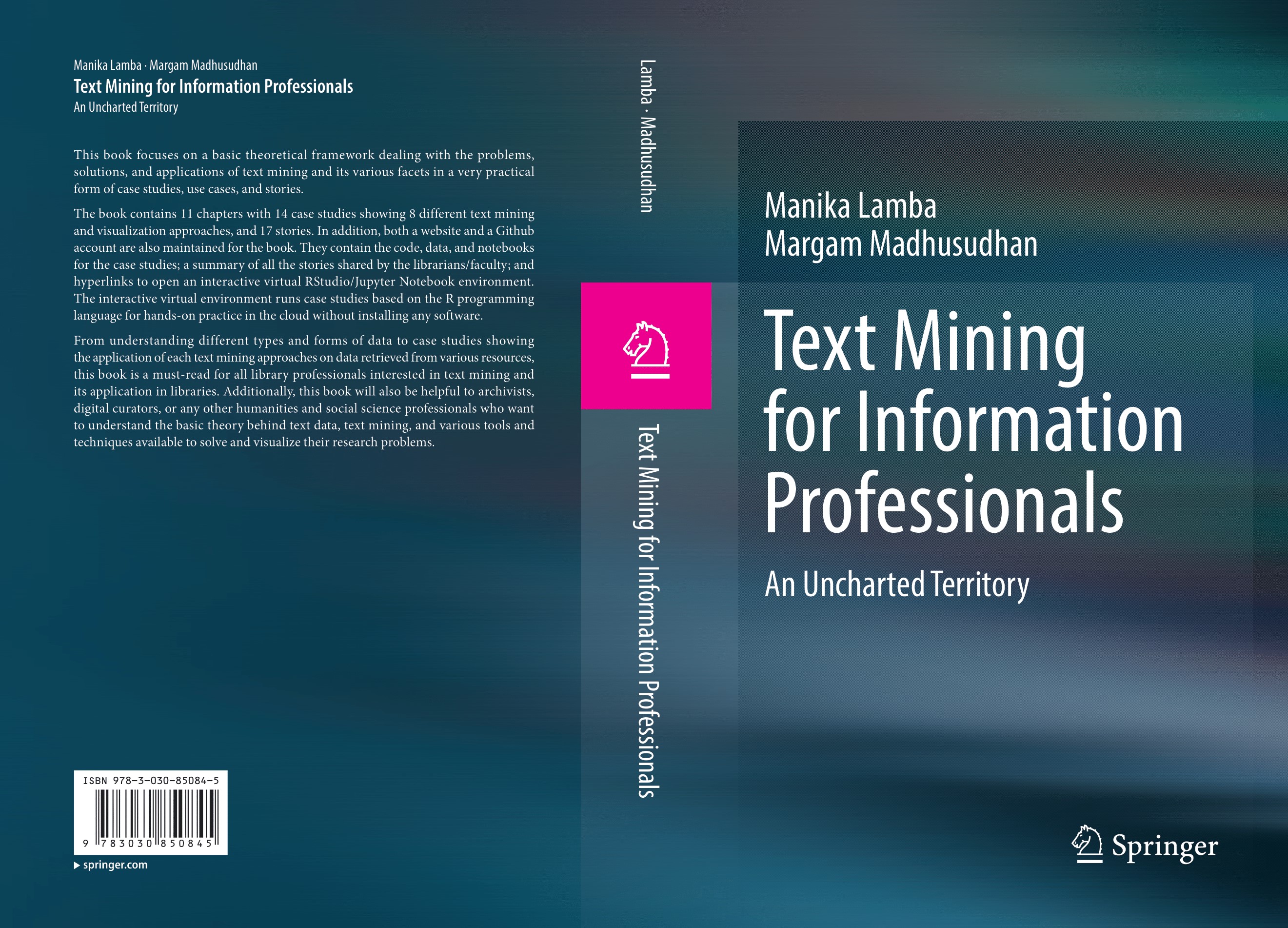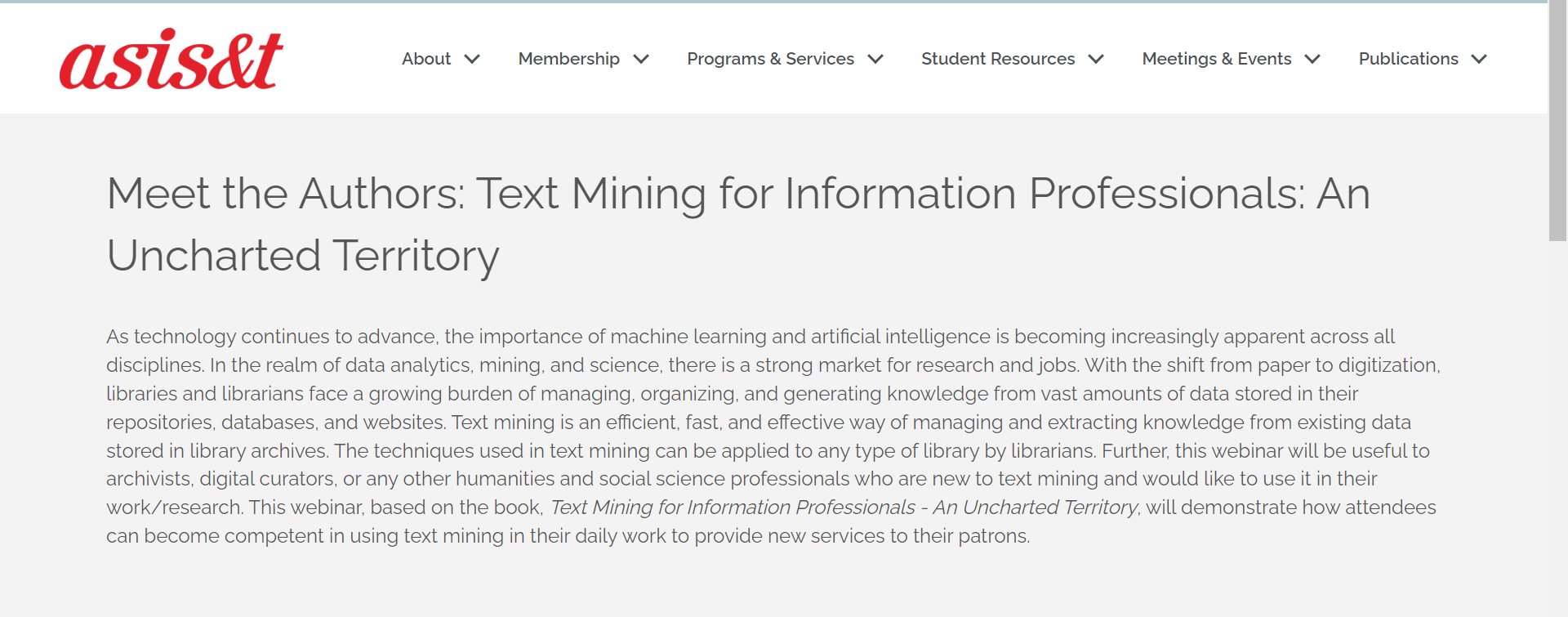Text Mining for Information Professionals - An Uncharted Territory
in Book Text Mining
November 27, 2021

About this Book
Machine learning and artificial intelligence are the futuristic approaches dominating all disciplines currently. Data analytics, data mining, and data science are some of the significant sub-domains with a strong market of research and jobs at the moment in the world. With a long leap from paper to digitization, the burden on libraries and librarians has increased to manage, organize, and generate knowledge from such a massive amount of data stored in their repositories/databases/websites. As libraries deal with a higher percentage of textual data daily, this book focuses primarily on textual data and presents various text mining approaches through a new lens. Text mining is a very efficient, fast, and effective way of managing and extracting knowledge from existing data stored in the archives of libraries. This book will make every library and information professional competent to use text mining in their daily life and get the best out of it by serving their patrons, researchers, faculty, or scientists with new services. Text mining techniques can be applied to any library type, be it a school, university, or special library by the librarians. It will help to provide the right information to the right user at the right time by providing services like recommendation services, current awareness services, or selective dissemination services to its users.
From understanding different types and forms of data to case studies covering primary research showing the application of each text mining approach on data retrieved from various resources, this book will be a must-read for all library professionals interested in text mining and its application in libraries. Additionally, this book will be helpful to archivists, digital curators, or any other humanities and social science professionals who want to understand the basic theory behind text data, text mining, and various tools and techniques available to solve and visualize their research problems.
Key Points of the Book
- Contains 14 demonstrative step-by-step case studies which show how to conduct 8 different text mining and visualization approaches on 9 distinct data type sources
- Provides case studies demonstrating the use of five open-source software for both non-programmers and programmers
- Reproduces six case studies using R programming in the cloud without having to install any software
- Story section presenting 17 real-life experiences of the application of text mining methods and tools by 24 librarians/researchers/faculty/publishers
- Elucidates 19 open-source text mining and visualization tools with their advantages and disadvantages
- Illustrates various use cases that show how text mining strategies have been used in different ways in libraries across the globe
The book contains 11 chapters, 14 case studies showing 8 different text mining and visualization approaches, and 17 stories. A website (https://textmining-infopros.github.io/) and a GitHub account (https://github.com/textmining-infopros) are also maintained for the book. They contain the code, data, and notebooks for the case studies; a summary of all the stories shared by the librarians/faculty; and hyperlinks to open an interactive virtual RStudio/Jupyter Notebook environment. The interactive virtual environment runs case studies based on the R programming language for hands-on practice in the cloud without installing any software. Text mining is a topic of international interest, and this book has been written to meet the reading interests of both national and international audiences. It will be appropriate for both beginners and advanced-level readers as it has been written keeping their information needs in mind.
Many books in the market are written to meet the need of computer science professionals on text mining, whereas there are very few books on text mining for librarians. Also, the books present in the market on this topic are very difficult for non-programmers to understand. They may contain lots of jargon, which may not be easily understood by a library professional. In contrast, this book focuses on a basic theoretical framework dealing with the problems, solutions, and applications of text mining and its various facets in the form of case studies, use cases, and stories.
Table of Contents
- Chapter 1: The Computational Library
- Chapter 2: Text Data and Where to Find Them?
- Chapter 3: Text Pre-Processing
- Chapter 4: Topic Modeling
- Chapter 5: Network Text Analysis
- Chapter 6: Burst Detection
- Chapter 7: Sentiment Analysis
- Chapter 8: Predictive Modeling
- Chapter 9: Information Visualization
- Chapter 10: Tools and Techniques for Text Mining and Visualizations
- Chapter 11: Text Data and Mining Ethics
- Appendix A: Online Repositories Available for Text Mining
- Appendix B: Language Corpora Available for Text Mining
- Appendix C: Text Data and Mining Licensing Conditions
Media
Meet the Authors: Text Mining for Information Professionals: An Uncharted Territory
I was invited by Association for Information Science and Technology (ASIS&T), a preeminent professional association in information science, to give a talk on the book! The webinar will take place on 7th December 2023. Please register here: https://t.co/IKjjK1Yhl7

IFLA SCITECH Webinar: Text and Data Mining Work at Virginia Tech University
Libraries International Federation of Library Associations & Institutions (IFLA), an international body of libraries and information professionals, invited following faculty/librarians/researchers who submitted their practical experience of using text mining in their libraries or research in the story section of the book:
- Leverage Undergraduate Student Researchers to Deliver Text Data Mining Services to Library Users
- TDM Working Group at the University Libraries at Virginia Tech
- Visualizing Topic Networks in Personal Correspondence: The Richards/Turner Letters
- Natural Language Processing (NLP) for Sensory Science
Mention on University of Toronto’s Website
The book was listed in the University of Toronto’s major Text and Data Mining (TDM) platforms and collections!
Citation
MLA
Lamba Manika and Madhusudhan, Margam. Text Mining for Information Professionals: An Uncharted Territory. Springer, 2022. https://link.springer.com/book/9783030850845.
APA
Lamba Manika and Madhusudhan, Margam. (2022). Text Mining for Information Professionals: An Uncharted Territory. Springer. https://link.springer.com/book/9783030850845.
Chicago
Lamba Manika and Madhusudhan, Margam. Text Mining for Information Professionals: An Uncharted Territory, Switzerland AG: Springer, 2022. https://link.springer.com/book/9783030850845.
- Posted on:
- November 27, 2021
- Length:
- 5 minute read, 955 words
- Categories:
- Book Text Mining
- See Also: